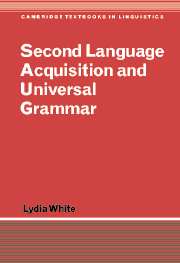Book contents
- Frontmatter
- Contents
- Preface
- Abbreviations
- 1 Universal Grammar and language acquisition
- 2 Principles of Universal Grammar in L2 acquisition
- 3 The initial state
- 4 Grammars beyond the initial state: parameters and functional categories
- 5 The transition problem, triggering and input
- 6 Morphological variability and the morphology/syntax interface
- 7 Argument structure
- 8 Ultimate attainment: the nature of the steady state
- Glossary
- Notes
- References
- Index
1 - Universal Grammar and language acquisition
Published online by Cambridge University Press: 05 June 2012
- Frontmatter
- Contents
- Preface
- Abbreviations
- 1 Universal Grammar and language acquisition
- 2 Principles of Universal Grammar in L2 acquisition
- 3 The initial state
- 4 Grammars beyond the initial state: parameters and functional categories
- 5 The transition problem, triggering and input
- 6 Morphological variability and the morphology/syntax interface
- 7 Argument structure
- 8 Ultimate attainment: the nature of the steady state
- Glossary
- Notes
- References
- Index
Summary
Introduction
This book will be concerned with characterizing and explaining the linguistic systems that second language (L2) learners develop, considering in particular the extent to which the underlying linguistic competence of L2 speakers is constrained by the same universal principles that govern natural language in general. Following Chomsky (1959, 1965, 1975, 1980, 1981a, b, 1986b, 1999), a particular perspective on linguistic universals will be adopted and certain assumptions about the nature of linguistic competence will be taken for granted. In particular, it will be presupposed that the linguistic competence of native speakers of a language can be accounted for in terms of an abstract and unconscious linguistic system, in other words, a grammar, which underlies use of language, including comprehension and production. Native-speaker grammars are constrained by built-in universal linguistic principles, known as Universal Grammar (UG).
Throughout this book, non-native grammars will be referred to as interlanguage grammars. The concept of interlanguage was proposed independently in the late 1960s and early 1970s by researchers such as Adjémian (1976), Corder (1967), Nemser (1971) and Selinker (1972). These researchers pointed out that L2 learner language is systematic and that the errors produced by learners do not consist of random mistakes but, rather, suggest rule-governed behaviour. Such observations led to the proposal that L2 learners, like native speakers, represent the language that they are acquiring by means of a complex linguistic system.
- Type
- Chapter
- Information
- Second Language Acquisition and Universal Grammar , pp. 1 - 21Publisher: Cambridge University PressPrint publication year: 2003
- 5
- Cited by



